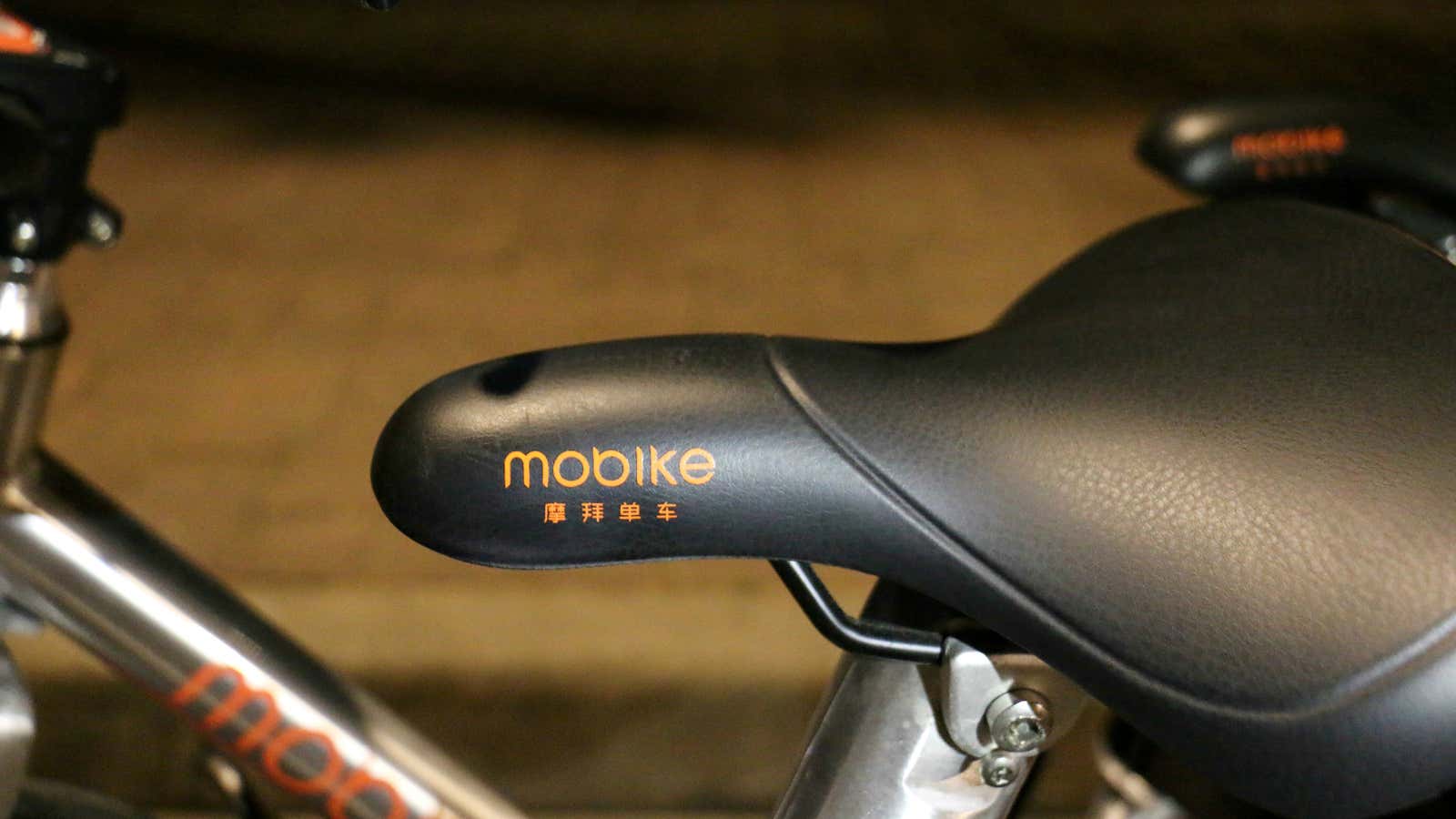In their home market, China’s bike-sharing companies are charging full speed ahead. But in the West, they’re stuck in first gear.
Throughout 2016 and into this year, thousands of bicycles flooded (some would say littered) the streets of China, as startups vied to become the country’s “Uber for bikes.” Unlike with most bike-sharing schemes, the “dockless” services that have emerged in China allow bikes to be parked anywhere, not just in designated racks. This feature is a blessing and a curse–while there are usually plenty of bikes conveniently parked near you at any given moment, they’re also a bit of a mess, and bait for thieves and vandals.
That’s not stopping the companies from moving out of China, though. Mobike, a bike-sharing company based in Shanghai, announced today it closed a $600 million funding round to finance its international expansion. A few days ago, it said it will soon dump a thousand bikes on the streets of Manchester, England, marking its first major expansion outside of Asia (inside Asia, it’s also in Singapore).
It isn’t the only bike-sharing (or bike-rental, as some prefer to say) player from China to set its sights on the West. But the bike companies have expanded at a snail’s pace—suggesting that local regulations will handicap a Chinese-style bike boom in Western locations.
Both Chinese bike-sharing companies and US-based competitors (“copycats,” if you will) have announced plans to bring the model stateside.
Bluegogo, which trails the leaders Mobike and Ofo in popularity in China, announced in December it would launch in San Francisco. Ofo launched a trial run in Austin, Texas during the South by Southwest festival in mid-March. In Silicon Valley, Limebike, founded by two Chinese entrepreneurs, announced that same month it raised $12 million in funding from Andreessen Horowitz, one of the most prestigious venture capital firms in California. And Spin, headed up by alumni from Lyft and Y-Combinator, publicly unveiled itself to the tech world in January, and disclosed an $8 million funding round soon after.
Yet despite ambitions to sweep the West, progress has not kept up with the pace seen in China.
In England, Ofo has had 20 bikes on the streets of Cambridge since April, but it has yet to expand its fleet to China-style proportions. Limebike announced in June it had brought 125 bikes to the University of North Carolina, Greensboro—marking a start, but hardly the sign of a splash. Spin intends to put its bikes on the streets of Seattle by July, but it says it hasn’t reached an agreement with the city as to how many bikes it will deploy.
And as for Bluegogo’s foray in San Francisco? It already folded. Indeed the service even started, and it has yet to launch anywhere else in the US. Mobike, Limebike, and Spin tell Quartz they are in talks with other US cities, but won’t specify which ones.
The slow pace stands in stark contrast to China, where Mobike, Ofo, and their ilk marked their arrival in a city by scattering bikes on nearly every street corner. It also differs from Uber (and Lyft, to a lesser extent), which got big in the US by entering cities first and dealing with angry municipal governments later.
What explains the lag? For starters, it’s much easier for regulators to control a bike-sharing company than a ride-hailing service like Uber. Whereas a quasi-legal Uber car is nearly untraceable unless you’re actually in one, bike-shares are easy to spot (especially if the bikes are piled up) and trace back to the company that owns them.
Current or former employees at Limebike, Bluegogo, and Spin all say they have actively negotiated with local governments in advance of a launch—unlike in China, where city regulators have struggled to catch up with the industry’s speed. But in the US, these negotiations can make it impossible for the wheels to ever get moving.
Take San Francisco, for example. In advance of its launch there, Bluegogo shipped hundreds of bikes, and kept them in a warehouse ready for deployment, former employee Ilya Movshovich says. But once the government took notice of the plans, it passed regulations (pdf) making it unfeasible for the company to operate there.
The new rules said such companies must pay the city to install more bike racks, reimburse it for the cost of citation and investigation of lost bikes, provide unlimited rides for low-income riders, and not “conflict with existing contractual bike share system.” The latter likely refers to Motivate, a New York-based company that provides docked bike-share schemes in partnerships (often exclusive ones) with many cities across the US, including San Francisco.
To date, no dockless bike-share service has launched in San Francisco, a city synonymous with tech startups.
The bull case for such services in the US and UK is similar to the one investors and founders have trumpeted in China—with GPS tracking, online payments, and automated locking, the bikes provide, in essence, a new form of transportation.
Other investors, however, see the US and UK as unpromising destinations. ”I think that the business prospect will be smaller in the US versus China,” says Jenny Lee, managing partner at GGV Capital. Her firm invests in companies in both the US and China. It was an early investor in Didi (China’s answer to Uber) and has funded one minor player in China’s bike-sharing race.
For the model to work, Lee explains, “you can’t just have 100 bikes out there. You need to have two or three thousand bikes out there. But if your population is too small or too widely spread out, that arrangement may not work.”
With a thousand bikes set to enter Manchester, Mobike will get bragging rights among its peers for the largest number of bikes deployed in a single Western city. Then it will have to repeat, again and again.
